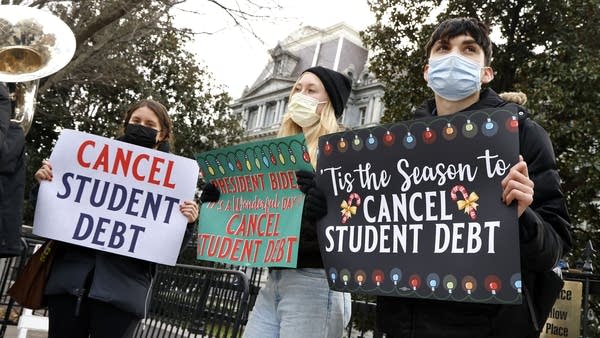Who would benefit the most from student debt relief?
Student debt cancellation would be an essential move toward affordable higher education, says Felicia Wong, president and CEO of the Roosevelt Institute.

Student debt holders have been able to defer payments during the pandemic because of a moratorium that in April the Biden administration extended until August. As reports come suggesting the president is mulling forgiving millions of dollars in student loans, questions are circulating as to what debt relief would look like, including who would actually receive those benefits.
Felicia Wong, President and CEO of the Roosevelt Institute, a liberal-leaning non-profit think tank, argues that student debt cancellation would be an essential move toward making education in the U.S. more affordable.
“It was a policy choice to fund higher education through individual investment,” said Wong. “And that was basically a big mistake because it’s led to a lot of indebtedness for families without the kind of income or job or class benefit that a college degree is supposed to bring.”
On today’s Economic Pulse, Marketplace’s David Brancaccio checked in with Wong about the state of student debt today, including who holds the debt, what higher education used to look like, and what the Biden administration may look to do in the near future to address the issue.
The following is an edited transcript of their conversation.
David Brancaccio: All right, let’s do some myth-busting here. People have their preconceptions. Who holds student debt in this country?
Felicia Wong: Well, the people who hold student debt in America are not those that you would think, David. It’s not just the Harvard kids. And so I want to talk about that. But I’d like to step back and to set the stage a little bit about the current debate. Because there’s a lot of discussion right now, as you know, as to whether or not the Biden administration is going to cancel student debt. This is the debt that families have taken out to send their kids to college, you and I are sending kids to college, which we can also talk about. But you know, a lot of the conversation right now is, when will it happen? How much per borrower, and these are important debates, but there really is a bigger picture here. And one reason that we at the Roosevelt Institute are so excited about the movement toward student debt cancellation, is that it signals a commitment to a new approach to higher education because cancellation acknowledges that the way we funded college going for the last generation really hasn’t worked. It was a policy choice to fund higher education through individual investment. And that was basically a big mistake because it’s led to a lot of indebtedness for families without the kind of income or job or class benefit that a college degree is supposed to bring.
So that gets us to the first question you asked: who holds, you know, student debt right now? Most of the people who hold student debt aren’t necessarily Ivy League. In fact, only 1% is Ivy League sort of beneficiaries. Almost 40% of borrowers don’t have a college degree, they started college but had to drop out. Student debt is disproportionately held by Black borrowers. Black college students are the most likely to use federal loans. Almost 70% of Latino student borrowers have debt. So the picture of debt holders here is really a picture of all of America really across our income and wealth spectrum. It’s one of the reasons that this privatized system of financing higher education has not worked out.
Brancaccio: Yeah, I mean, to get you back to your point about it was a policy choice. So this is not necessarily a discussion about, well, “If you want to buy a Mercedes, BMW, or Lamborghini, you gotta pay. And if you can’t afford it, then you got to borrow.” That, in fact, is a choice about how we thought we would finance something that some campuses charge a lot for.
Wong: That’s right. And it’s important to remember that we really used to have a different kind of college system. We used to have a really robust public university system that most Americans could afford. You know, in the 1950s, my parents were immigrant kids living in Oakland, Chinatown. They went to UC Berkeley, which was, you know, the college down the street, for $81 a semester. So, David, I don’t think that’s the college-going experience that we had. And it’s definitely not what we’re looking at for our kids because that system, that public affordable college option, has largely collapsed in this country. So student debt has really skyrocketed over the last 30 years, the number of debt holders has more than doubled in that time. And as I said, many of the people who took out debt in order to improve their long-term earnings prospects really aren’t benefiting from this because they aren’t actually college degree holders. And many of them are really struggling under the weight of indebtedness, that they can’t do things like put a down payment on a house, they’re delaying getting married. And so part of the decision now to forgive debt is really about, is really a recognition that indebtedness isn’t something that is paying off. And so we need to take a step towards a much more public system of both financing and offering higher education.
Brancaccio: So what do you think, Felicia, you’ve worked with the Biden people, you’ve advised them. We going to get any of this debt relief?
Wong: You know, I think we really will get some debt relief. You see it in the news right now. The president has talked about it. Jen Psaki has talked about it, the debate right now as to how much the president might make a decision to relieve is it going to be up to $50,000 a student, which is what both Sen. Schumer and Sen. Warren and a host of other Democrats are asking the administration to do? Is it going to be something less than that? $10,000 or $20,000 per borrower? I think they will do something because you see them talking about this so publicly. And I really hope it’s a step towards acknowledging this mistake of depending on a privatized system to pay for, frankly, one of our biggest investments, our country’s biggest investments in our future. Making sure that young people have a great education is about investing in our future economy and in our families and in our communities. So I think that if the Biden administration does decide to do some kind of debt relief, it will be one step toward this kind of free public college system like the one my parents benefited from, the ones that many Europeans benefit from. I think we can do this, and I think debt relief would be a great step in that direction.
Brancaccio: You know, if the system has changed, the mindset has to change for, actually, families and students. I mean, often they go shopping for campuses based on all the fancy, expensive frills. And there’s this kind of war going on among campuses to offer what the students think that they want. And if we change the financing system, that outlook by the students themselves may need to change.
Wong: That’s absolutely right. One of the things we’ve seen is a kind of financialization of higher education because as colleges have said, we need the fanciest dorm rooms or the fanciest, you know, theaters or the best food services. One of the things is that that costs a lot of money, and increasingly, Wall Street has actually financed a lot of that. Not a lot of this is actually going towards an educational experience. I think more money in colleges needs to go towards the actual educational experience. And you’re right, David, that this means that families and students need to be looking towards those kinds of things, as opposed to, you know, who’s got the best football stadium?













